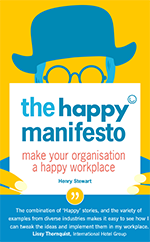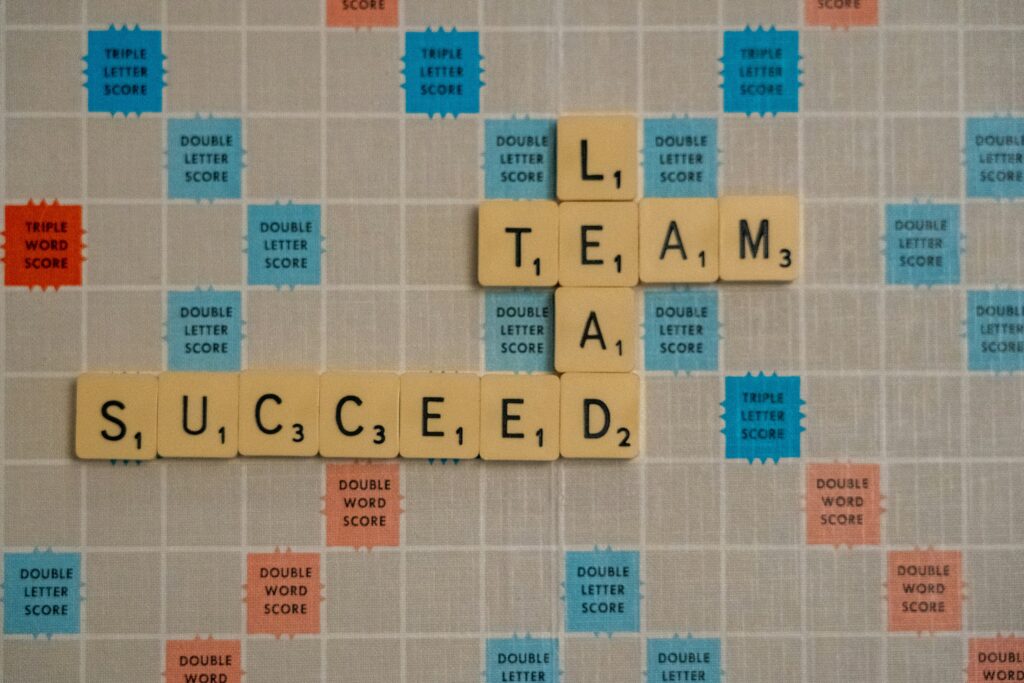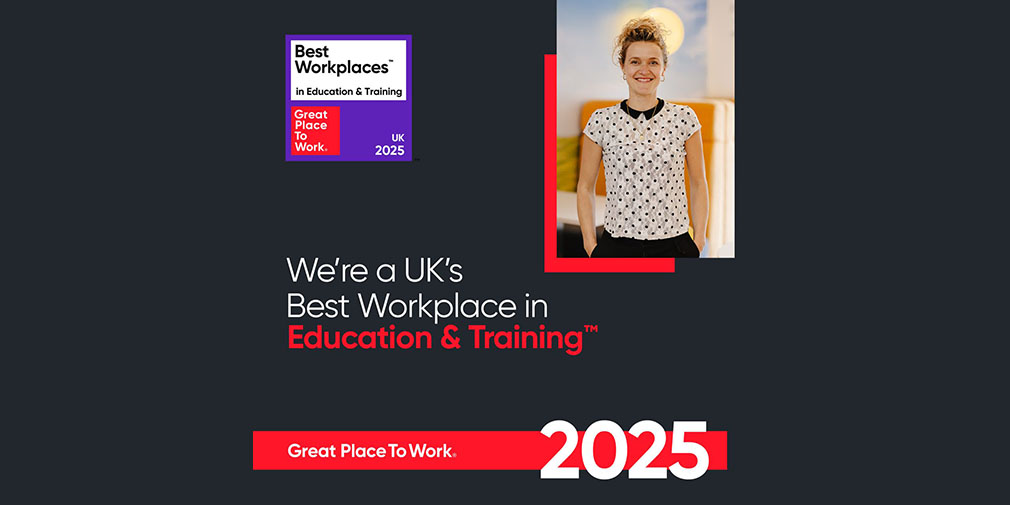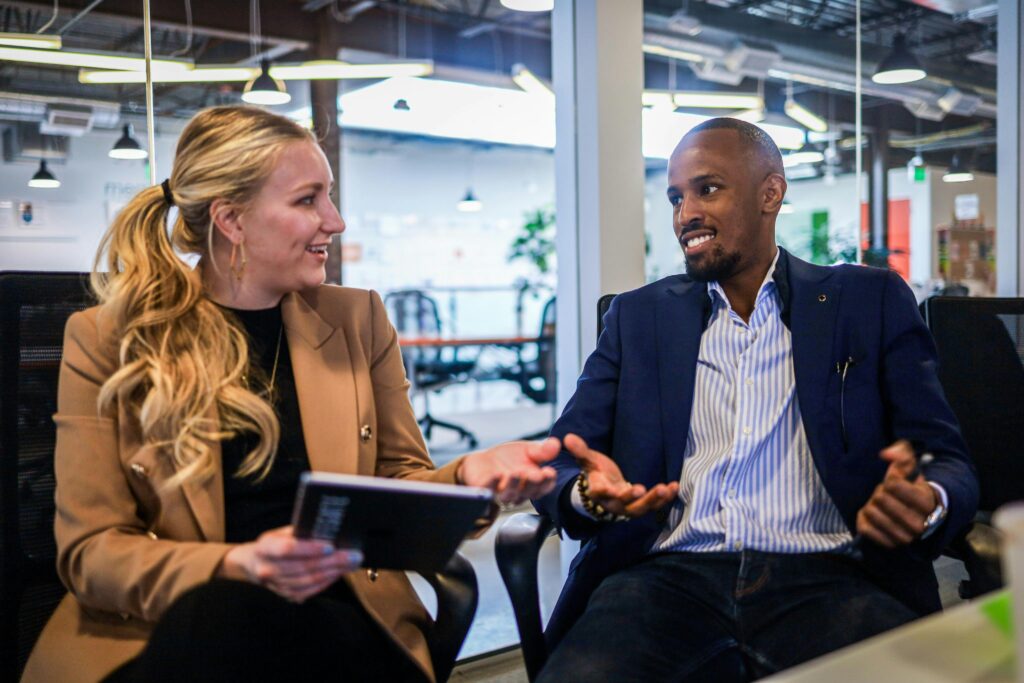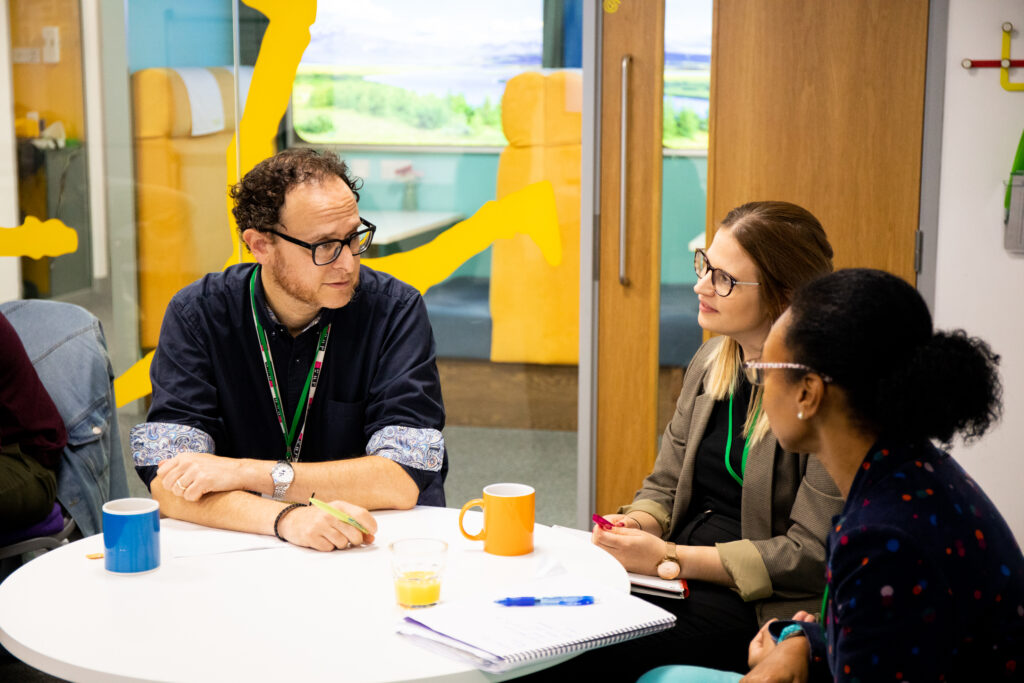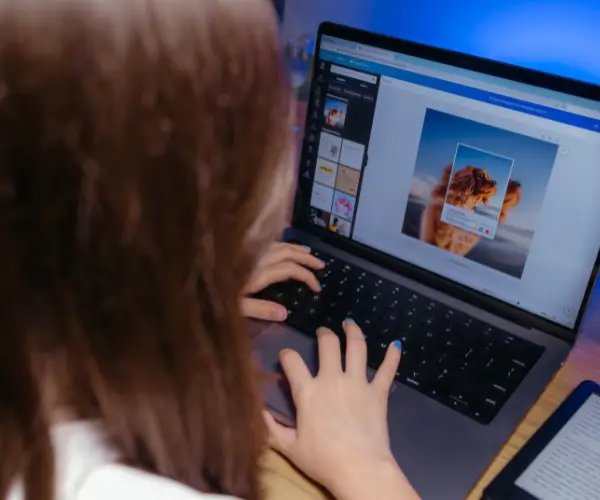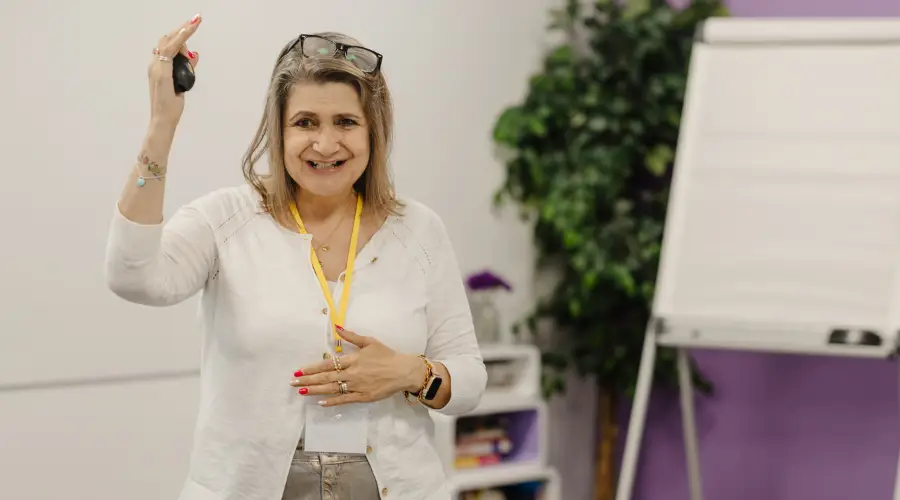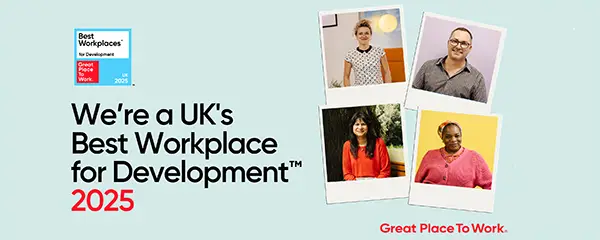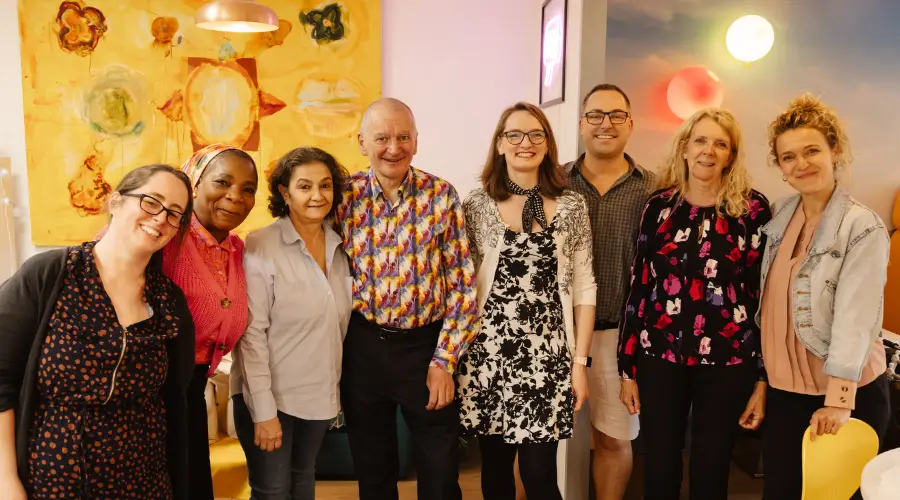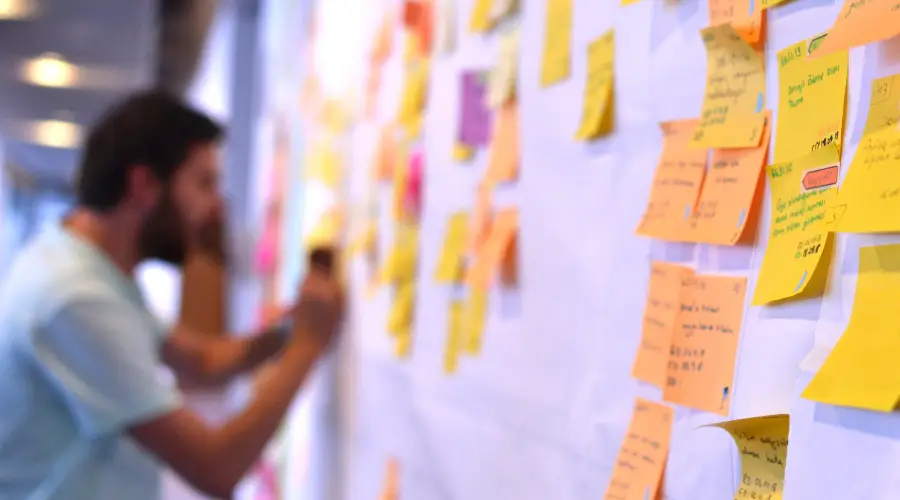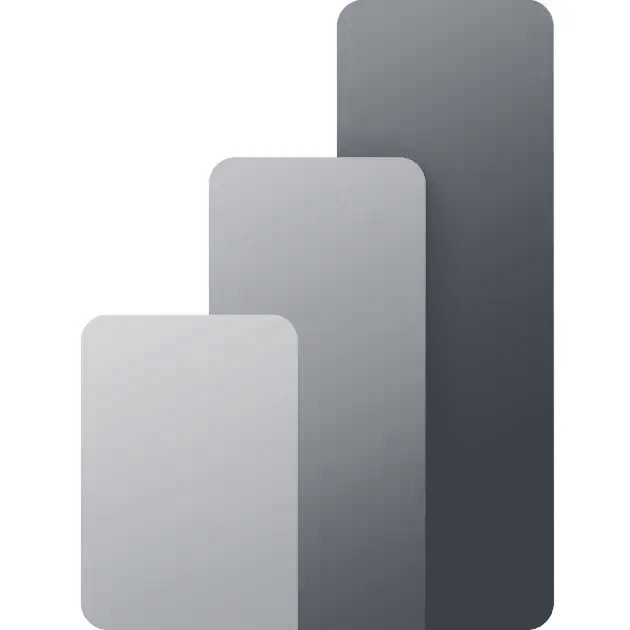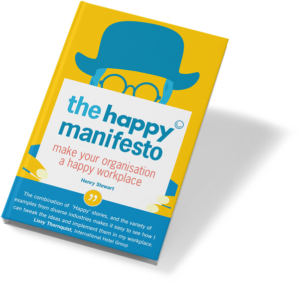Hi, I’m Alex and I’m Delivery Lead for GOV.UK for the Government Delivery Service. When I was invited to come and speak here today, I realised that I couldn’t get into the details of how we create a happy workplace without giving you a bit of background on what the mission at GDS is. This mission is a huge part of why people choose to travel to work with us from all over the country rather than working somewhere closer to home. The second part of my talk will talk about how our culture works to create an empowered and collaborative environment where I think people feel they can do their best work.
The Government Digital Service – or GDS for short – is a unit within the Cabinet Office that leads digital transformation in Government as a whole, collaborating with teams from other departments to build better public services and meet user needs. We work in small, agile teams of developers, designers, content designers, delivery managers, product managers, analysts, QA people and all kinds of others in between. We also run GOV.uk, the single domain website for Government.
The seeds of GOV.uk were sewn in 2010, when the Cabinet Office ask the then digital champion, Martha Lane Fox to do a strategic review of DirectGov, which, at the time, was the Government’s main online platform. What she delivered was a short letter entitled ‘Revolution, not evolution’ which evaluated the current offering in context to the whole government-wide digital ecosystem. Martha’s proposal for a digital by default strategy set in motion the work that would eventually see the retirement of DirectGov and the launch of the GOV.uk platform that we know today. These days, we do a lot more than run GOV.uk, including the creation of services and products as well as helping the rest of government make the most of the technology available to them. We are here to make it easy for the government to be digital and at the moment, it’s difficult and we want to work with our colleagues across government to change that.
To list a few of the things we do, we are responsible for building platforms, like government verify, which provide an easy way for users to confirm their identity. We also manage government as a platform, a common core infrastructure of shared digital components which make it easy to build user centric services. We create free components like email, text notifications, payments and even hosting that departments and agencies can plug their services into, knowing that they are secure, reliable and will be looked after for them, saving them time and more importantly the taxpayer’s money. At GDS we believe that local and central government and the wider public sectors will provide better digital services for the taxpayer if they have access to a more diverse group of suppliers. We want to put an end to outsourcing, which locks the government into using a select group of vendors, who don’t always offer the best solution for every case and we’re doing that as part of our digital marketplace program.
So, how do we achieve this diversification? We have 11 core principles which we published and to which we do everything by. We know that if we’re doing everything the principles tell us, we’re doing the right thing and if GDS culture began anywhere, it began with these. They’re not just about design and building applications, they’re built on collective wisdom, a guidebook, a staff handbook. They’re a learning tool and a motivational tool. One principle is to iterate and then iterate again. We never stop working to make things better and this has shaped how we do all kinds of things, from performance reviews, recruitment and to reporting. User needs has been a guiding principle from the very earliest days of GOV.uk and remains a top priority for GDS. We remind ourselves that the people just outside our windows are the people who are going to be using GOV.uk at some point, and it means that before we do anything we consider the following – what is the user need and why are we doing this? Our focus on user needs is unapologetic. If you prioritise the needs of everyone else over everyone else’s, including senior stakeholders and start building before understanding who the users are and what they need the service to do, you risk building something that no-one else needs or wants and tries to solve problems that aren’t important to users.
We have a catchphrase at GDS – Show the thing. This is one of our oldest phrases and a really strong part of our culture. The point of it is to encourage people at GDS to talk about work in progress, to literally show the thing. We all do this, when we’re presenting a service, we show pictures, screenshots or videos of the service. When we’re talking about users, we show pictures of users and user research and when we’re talking about a team, we show pictures of the team. Showing the thing is all about being open and it really helps you to make a better thing.
Should you ever visit us, you’ll see the culture all around you. Our office is colourful and decorated with bunting. Our walls are used for thinking out loud and for sharing work with colleagues. The environment produces the atmosphere and the atmosphere produces the work. Internal communication is really important and too often it’s overlooked. We don’t always get it right but one of the things that has worked is communicating via the walls and we make posters that remind ourselves of everything that matters. A really important poster we have is in response to how we’ve been growing and growing is brilliant because there are so many new brains, new skills and faces to get to know.
Maintaining that supportive, empowered and creative culture that we have is so important to us because it’s difficult for those newcomers to expect and what’s expected from them. They often say how different it is to where they’ve come from, where there may be a lot of hierarchy or a very customer facing culture. Now, of course you get told all the official stuff such as how you get paid and who your line manager is but it’s harder to communicate the unofficial stuff, the things that are good to know but it’s no-one’s job to tell you, the things you’ll probably find out in your first few months by accident because someone’s mentioned it in passing and you think to yourself ‘is that a thing?!’ So it occurred to us that maybe it would be helpful to spell out the unofficial stuff, upfront, to be explicit about the things that those of us who have been here longer take for granted. At GDS, it’s ok to say ‘I don’t know’; to stay at home when you feel ill, say that you don’t understand, ask what acronyms stand for, ask for help, to have a loud day, to put your headphones in, say ‘No’ when you’re too busy, to make mistakes, to sing, not check your emails out of hours, to go and talk to someone face-to-face, to go somewhere else to concentrate; it also says it’s ok to challenge things you’re not comfortable with, to work how you like to work and to ask management to fix it and I really like this about GDS.
So, if you were to create your own ‘It’s ok to’ list, what are some of the special parts of your culture that you would let a new starter know about or perhaps remind some of your ‘old-timers’ of?
I’m going to ask you to talk about this in your groups and whilst you’re talking about it, think about whether there are things that your organisation wouldn’t support and what would happen if you just put them on your list?
Ok, so I’m going to ask some of you to tell the rest of us what you were talking about at your tables. Who wants to go first?
First delegate – ‘I work in an open plan office with four or five teams on our floor, we’re the training team and we’re loud people who like to talk all day long but all the other teams don’t like it, so the talk out loud and be yourself thing would not go down well with the 40 or 50 other people on my floor.’
Alex – So maybe it’s challenging how you work to find a way to allow some teams to be loud while others are quiet. Ok, next table?
Second delegate – ‘We’ve recently got a new CEO and we’re under quite a lot of pressure as we’ve got some big projects on, she has said ‘just be nice to each other’ and I thought it was a lovely sentiment and one that’s really important to remember.
Alex – Excellent!
We’re really big on diversity and we’re determined to be better at it. A couple of years ago GDS wanted to be its ‘better self’ when it came to the treatment of women. So, we self-organised and in this case, the Women’s Group was created. It’s a group for everyone, irrespective of gender, who cares about having an equal and diverse place of work at GDS. Amongst its many achievements is the increase in women in tech roles, with code bar and makers academies, getting more junior developers into the industry, into GDS and our parity pledge and for more diversity at conferences and events. As a result, we have new rules. No-one at GDS will take part in a panel event or discussion of two or more people unless there’s at least one woman, not including the chair and no-one will talk at an event unless the event’s organisers are clearly working towards gender diversity onstage. We’ve had the courage of conviction to see that through and there have been occasions where we haven’t turned up at things. It’s not about absenting ourselves from those kind of conversations, it’s about making those conversations better and none of that would have happened without our Women’s Group.
We believe that transforming government together would be impossible without diversity. It is often invisible and when our workplaces aren’t diverse and when we can’t see it, and when our culture doesn’t encourage people to be comfortable at work, we all suffer. If someone is hiding who they are, as an organisation we won’t be getting the best from them and we won’t be able to invest in them the way that we should and that’s not ok. This applies to every kind of diversity we want to see in the civil service, whether it is sexual orientation, gender identity disability, race, social background, whatever, we need to create an environment where people can be themselves and give their all. We won’t transform government without it.
I’m proud that our organisation challenges itself to be better on diversity, we recognise our role in shaping the industry we’re part of and we put rainbows on our windows and take part in pride events to celebrate this and acknowledge that we have a responsibility to change that.
I’d like to share a story. This is Laura, she used to be called Paul. At the beginning of 2016, my colleague Laura decided that she wanted to transition full time to live her life as a woman rather than as a man. During 2015 she’d come out as transgender to everyone outside her work and was living most of her life in the way she wanted. When Laura made this change, for me, it was easily the most proud I had felt working at GDS. Laura had been working at GDS for about two years and one of the things that really struck her when she first joined was the open conversations about identity politics compared to previous places of work; knowing that people, particularly people in her immediate team, were aware and informed on transgender issues was an enormous confidence boost and was a huge reason why she felt that she could make that big jump. It made something that was unspeakably terrifying into something that was a plausible option. When she spoke to our people team about announcing her transition she was asked ‘how would you like to approach it?’ In the end, it was simply communicated as a footnote at the end of a weekly all staff email, you may not even notice it, however the next day came around and that was it, colleagues used the right name and pronouns and she’s had an entirely positive experience. The main thing for Laura was that she was treated with respect and the culture at GDS is one of the big draws. Having other inclusive networks available to her such as LGBT and women at GDS groups is key for people to know that they have a space to freely and openly discuss issues that may be affecting them. Laura was fortunate enough that she had colleagues that empowered her to get on with something that she now feels she should have done a long time ago and having that awareness and respect for others can make a huge difference in someone else’s life, it’s important that we all understand this.
Finally, I would like to tell you about our People Board. We have a member of the board here with us today, Hello Nick!
The board’s job is to make GDS a better place to work, it’s a mechanism for getting things done and exists to turn ideas into actions. Members are nominated by their colleagues and they are expected to represent the views back to senior management. Crucially, the senior management at GDS has already said that they will say yes to the board’s recommendations unless there’s a good reason to say no. There’s a member of senior management on the board too, our COO chairs the People Board meetings and acts as a useful conduit between the board and management and that gives the board a mandate to change things. They set up an email account and a slack channel as easy and informal ways for people to get in touch but found once again that it was the walls, the whiteboards on the walls to be exact, were by far the most popular ways to raise issues. They can be a bit unruly at times and hilarious at others, they’re inspiring places for collaboration and communication and on more than one occasion someone writes a question and someone writes an answer underneath, people will plus one things to say they support it and the People Board boards are a good way for us to share ideas, raise issues in an informal way and sometimes just vent frustration about things that aren’t working well.
So, what does all of this mean? Having a People Board is not just a way for management to avoid day to day problems because of the things that the board raises are bumped up to them anyway. It’s not a way for individuals to wield power either because the board discusses everything as a group to reach a consensus. It’s something else. Our former boss Mike Brecon summed it up like this – ‘It’s management by the team, not the managers.’
I have another question for you and your tables – If you had a mandate from senior management to decide, on behalf of the people, things that would make your organisation a better place to work, what would they be?
Alex – ‘Nick, what happens to all the stuff that’s written on our boards?’
Nick – ‘We take a picture of it and upload it to a google file that the People Board can see and it gets fed into what we discuss. A lot of the stuff given as an example was sent to estates as they deal with any problems in the building, we’re in an old building and there aren’t a lot of repairs happening as we’re going to be moving. The other thing we do is keep another board to feed back to everyone, as well as through the weekly email that goes out to the rest of GDS, to say exactly what’s going on to try and help resolve things.
Alex – Another table?
Second delegate – ‘We have dress down day on the Friday at the end of the month and the atmosphere changes dramatically. It’s really productive, engaged and people talk to each other in a way they don’t the rest of the time. There’s a dress code that’s a bit ambiguous and why can’t we just relax the dress code? We had a bit of a debate about customer facing roles and why that may not be appropriate in some circumstances but the general consensus is to relax the dress code.
Third delegate – We’ve gone from stiff white coats and uniforms long ago to creating more uniformity with the people we’re facing. I work in the NHS and we’re getting reports of low cleavage when giving physical examinations or skirts that are maybe too short in meetings so we’ve had dress code reintroduced because that’s what the service users have asked for. They like to know the Doctor when they walk into the room, not tattered trainers and jogging bottoms and that sort of thing so we’ve had to have a sort of minimum standard reintroduced.
Fourth delegate – What’s the minimum standard?
Third delegate – Well, clean! (Everyone laughs) because, for medical and nursing schools Wednesday afternoons is sporting day, so you’ve just gone rowing and now you’ve got to come and clerk a patient on a ward, just please take 5 minutes to have a shower before coming onto the ward. Also, as little exposure as possible, that will cause discomfort to anyone receiving your care and just look the part really.
Alex – Ok!
Fifth delegate – Just one more thing, we do something here that we call integrated working. We’ve found that it’s working in some parts and not in others but the point made earlier about being in a noisy team, we’ve found that if you spend time with other teams – for example, I’ve spent time with my colleague here at her play centre working with her team and kids that I haven’t worked with before and I have a whole new understanding and appreciation for the work that they do and vice versa, I’m on the sports team and everyone thinks we have fun all day and when they come and work with us they realise there’s a lot more that goes into it than just kicking a ball around, so we’ve all agreed on this table that this is something that could work in their teams to spend a bit more time doing that.
Alex – Ace!
Alright, that’s all I wanted to talk to you about today. I feel incredibly privileged to work somewhere that is so transformative, empowering and so trusting but if we abuse that trust though, we are expected to behave like adults, fortunately though, it doesn’t happen very often and it is dealt with pretty quickly.
Anyway, we think that transforming government is about transforming the people that work together and in creating these empowering work environments and that’s what it’s all about.
We actually have fortnightly reporting when we ask the different teams to let us know how they’re getting on and see if they need any help with anything. We’ve introduced a policy, that’s quite formal about adding funny gifs into our presentations because we’re sat in this room for two days going through these updates that are obviously really interesting but it does start losing oxygen after a while and they help us!
So, there is time for some questions, does anyone have any?
First delegate – It’s more of a request, your ‘It’s ok’ list, would you be able to share that?
Alex – Yes, absolutely. To be honest most of what I’ve talked about today are taken from the GDS blog, so a lot of this, Laura’s story and our people team is on the blog so check it out.
Second delegate – I have contact with other parts of government and it’s not like that. It’s a lot more strict, formal and hierarchical and I don’t understand how you’re getting away with it? How are you getting through all the ministers and those that hold the candle for a more formal government?
Alex – By delivering. By spending taxpayer’s money sensibly and by having visible outcomes that improve the public’s views of government, so we’ve been able to build on it because it’s working. Part of it seems lots of fun but part of it enables and provides an environment where people feel safe to have more kinds of diversity, to have more kinds of minority representation a bit higher. It’s the diversity that creates better teams, an environment where people feel safe and trusted is what enables us to keep delivering well so that we produce results therefore, we can keep working like this.
Third delegate – Do your staff surveys reflect all of the great progress that you’ve been talking about?
Alex – It’s difficult because our staff survey is tied in with the cabinet office, so it’s a bit skewed by all of them but last year, my friend Henry ran a helpdesk with one of our GOV.uk conference days where we had an away day and we were talking about things like this and reminding ourselves of the ace place that we work in and what we can do to make the most of it.
Henry, what happened in the survey?
Henry – ‘We asked everyone whether they would recommend a friend to work here and although I can’t remember the exact score, it was the highest score we had ever had and was very high’
Alex – ‘Yeah it was very, very high so I was really pleased that day. Our turnover is quite low too.’
Fourth delegate – How long have you been working towards this?
Alex – I’ve been working with GDS for about 2 to 2 and a half years, so when I started it was already an embedded culture but since then it has matured and developed and there’s more spin off diversity groups giving more people a voice and it’s just getting bigger and better.
